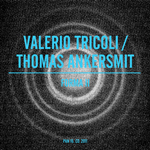|
|
 |
Dusted Reviews
Artist: Valerio Tricoli and Thomas Ankersmit Album: Forma II Label: Pan Review date: Jul. 20, 2011 |

|
|
|
 |
In a world where sound-enhancing technology proves to be more readily available by the day – to the extent that anyone with a pair of studio monitor headphones and a copy of GarageBand can claim to own a recording studio – the line drawn between the talented and the mediocre becomes more and more blurred. A great deal of respect is owed to experimental artists who manage to stand out amongst the lot, especially in crowded sub-genres like abstract electronica and electro-acoustic, where an ear for composition is quite necessary to produce something substantial.
Thomas Ankersmit and Valerio Tricoli have that ear (or ears) on Forma II, while also the sense to avoid things like slapped-on chorus, over-saturated reverb and other tempting post-production clichés. The album is divided into five tracks, with a clear shift in direction coming in the fourth movement. The first half consists of spiraling pockets of hissing static and the type of electronic sputter that characterized Fennesz’s sound on the albums Venice and Plus Forty Seven Degrees 56’37” Minus Sixteen Degrees 51’08”; the second smoothes out those pockets into a linear trajectory for a more rewarding listen.
The magnificent closer, “Takht-E Tâvus,” a lush tonal piece for overdubbed saxaphone played by Ankersmit, starts with glorious overtones before gracefully collapsing and building up once again in a way that Phill Niblock would most certainly appreciate. Ankersmit’s contribution to this track is clearly heard, which is a rare occurrence on Forma II. During the rest of the album, it’s impossible to establish who played what — or perhaps more accurately, who processed what (not to mention what exactly the “what” is — the duo claims to have incorporated “metal foil floating on ultrasonic sound-beams” and “mechanical clickers recorded in the abandoned radar domes at Teufelsberg”). Rather than attempting to pick apart every movement sound by sound, it’s best to sit back and enjoy it, which is rather easy to do.
By Adrian Dziewanski
|







